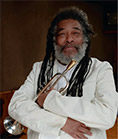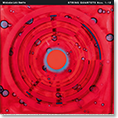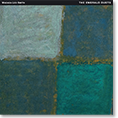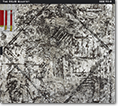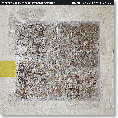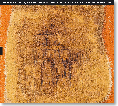ANDREW CYRILLE WITH GREG OSBY
In jazz, as in any other art and perhaps even in life, a duet is a challenge. For two people to play together would seem, on the face of it, easy and natural. But, as soon as you think that, you know it ain't so.
In spontaneous music-making - as in dance, comedy, juggling, acrobatics, trapeze-flying, friendship or any other kind of coupledom up to, including and beyond marriage - a two-partner collaboration by definition relies on different actors hammering out one experience. If a duet is to achieve its most rewarding potential, it seems to require mutual and candid recognition by its participants of their individual strengths and differences, reciprocal respect (if not greater admiration) and a significant amount of outright trust.
The successful duet essentially synthesizes two unique worlds through some formula enlisting balance and dynamic momentum in a rolling tumble. A duet must not be static - at least not if it is for the jazz lover. In a jazz duet, or any relationship meant to thrive rather than wither, the players must each maintain their own ground and that of their combined unit as it moves forward, shifts this way and that, evolves and transforms, repeatedly stating, demonstrating and restating its premises and parameters. The dynamic duet pushes beyond either or both partners' original ideas as each partner takes into account his own and the other's genuine contributions.
Andrew Cyrille's duets with Greg Osby triumph in all these dimensions, and then some. Their success rests on the collaborators' ability to invite our attentions from the start, and increasingly reward our awareness of the layers of beauty, meaning, nuance and interaction they impart towards most gratifying ends.
Cyrille is a master drummer who hears the world as a percussion orchestra, colored by rhythm and time. Osby is a brilliant melodicist and distinguished saxophonist whose laser-like tone and terraced manner of phrasing articulate multifaceted yet unforced song lines. Osby's horns and Cyrille's drums compliment each other superbly throughout this recording, which is a result of a collaboration that began following the musicians' meeting backstage after sharing a bill at a festival in France. That night they recognized a link, a bond - I think best described as a high regard for discipline, thought, preparation, the firm foundations from which unfettered improvisation can fly.
A veteran modernist, Cyrille emerged from 1960s ensembles led by Coleman Hawkins, Mary Lou Williams and Cecil Taylor, among others, to establish such bands of his own as Maono, Pieces of Time, Trio 3 and Haitian Fascination. He has also gradually become one of the leading exponents of duo improvisation, recording duets with saxophonists Anthony Braxton, Peter Brötzmann and Jimmy Lyons, pianists Borah Bergman, Marilyn Crispell and Irene Schweizer, fellow drummers Michael Carvin, Kenny Clarke, Milford Graves, Famoudou Don Moye and Vladimir Tarasov, bassist Peter Kovald and electronics designer Richard Teitelbaum.
Cyrille regards the duet format without undue intimidation. "With me, it's always about finding what I need for the music first, then playing with the sound of the instruments there. When I don't have a bass player I don't worry about him," he says. Of course, this is also the man who dared to record the first unaccompanied solo drum album (What About, BYG-Actuel) in 1969.
Osby, for his part, graduated from teenage rhythm 'n' blues gigs in his hometown of St. Louis to scholarship studies at Howard University and tours with Muhal Richard Abrams, Dizzy Gillespie, Jack DeJohnette, Jim Hall, Andrew Hill and Woody Shaw. In the 1980s, he co-founded the M-BASE collective with fellow alto saxophonist Steve Coleman, drummer Marvin "Smitty" Smith and singer Cassandra Wilson, among others, offering a progressive alternative to the prevailing neo-traditionalist esthetic. Since the 1990s, Osby has come into his own on Blue Note Records, introducing bold original repertoire and fresh talents including pianist Jason Moran, violinist Christian Howes, bassist Scott Colley and drummers Eric Harland and Rodney Green. Osby likes to reach out to those around him; he believes in listening to himself as he thinks a fan would.
Though both Cyrille and Osby practice music for its rewards of self-expression and exploration, neither would depend solely on raw chops and first responses to generate the substantial communion they sought for this record. Following that initial meeting in France, the two performed as a duo at downtown New York's invaluable club Tonic. Then, for this recording, they consulted, they rehearsed and they came to agree upon themes and directions.
As Cyrille says, "We improvised the tracks on the basis of preconceived, specific written material. The drum set allows one to play in many different ways and take a variety of approaches. But my method when we recorded was to concentrate on listening closely to Greg, to absorb his spirit through his sound, and work with that alongside the intellectual properties of the music."
Osby's usual method was entirely compatible. "I try to be more constructive than haphazardly putting things together then sitting back and gloating, 'That´s what I heard,' or 'Ok, that's cool,'" he says. "I think what I play should be more than that. And you can´t be slipshod playing with someone like Andrew, anyway. It would have been reckless to squeak and honk through the whole thing."
Furthermore, "The formats themselves demanded to be acknowledged for their material. There was a great deal for me to work with, to start from - a lot of musical catapults which I could recap, refer to or return to. Andrew is a very interesting composer. It was great for me to be in that environment, playing his pieces."
It´s actually hard to recognize whose piece is whose here, as the musicians strike a perfect counterpoint whether exploiting cell-like motifs in "Striation" and "Low Blue Flame" (both Cyrille's) or "Equalatogram," "Cyrille in Motion" and "Concepticus" (all Osby's), swinging more conventionally in "Work" (Thelonious Monk's) and "The Music In Us" (Cyrille's), painting "With You In Mind" as a ballad or creating a tone poem in "No. 11" (both Cyrille's). In addition to the duo performances, Osby solos with penetrating grace on "Pop Pop" and "Noodle" and, in "Roscoe," Cyrille pays tribute to saxophonist Roscoe Mitchell by focusing on the unadorned sonics of every surface at hand, an adaptation of one of Mitchell´s compositional processes.
"A duet requires from me a different sensitivity than larger combinations," Osby explains. "I compensate for missing elements. I expand my solo and bass functions to provide pulsation. I provide myself with harmonic support, and try to increase the melodicism, to fill in the spaces. To make an engaging environment, I think of different conceptual springboards, different starting points, and different destinations. To avoid monotony, I avoid repeating the same devices and techniques."
"Andrew's drums suggested a lot of call and response, the acknowledgement of West African as well as American sensibilities - like drum chants with field holler connotations. He´s keenly aware of the drums' tuning, their sonorities and pitch elements and the texture he can get with various brushes, mallets, his hands. He provided handclaps and vocalizations. His drumming was even more orchestral than I had presumed it would be. "
"What I hear in Greg," Cyrille remarks, "is the forward motion in his playing, his phrases leading forth, his being calm but not laying back. I think he's extending the St. Louis tradition exemplified by Julius Hemphill, Oliver Lake and Hamiet Blueitt" - three quarters of the World Saxophone Quartet, with whom Osby has served as a sub, and all of whom Cyrille has worked with - "who I've always felt were influenced by Eric Dolphy."
High praise indeed, and no surprise - Andrew Cyrille and Greg Osby have a mutual admiration society. It's not a closed society, though. You are welcome to join. The application is simple. Simply listen, now and again.
New York City, January 1, 2006
Howard Mandel

